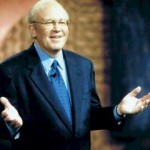Okay, let me start off by saying that I’m not saying he’s wrong. Or that I’m smarter than Ken Blanchard. I was reading what he says about the Four Pillars of Trust (being Able, Believable, Connected and Dependable) and it got me thinking that he’d overlooked one thing, and that’s the interplay of the four.
These are clearly four keys to establishing trust, or credibility, with your workforce, your clients, your family. But these are not static and depending on what’s going on in your workplace or home you will find that you may need to emphasize one over the other. Please notice that I said emphasize, which means that you never eliminate any one of the four. Ignoring any one of these for even as little as a day or an hour could have a much longer-term impact on your trustworthiness.
So I’m going to add an EF to Ken’s ABCD. Effective Flexibility. This doesn’t mean you stretch your believability, or make excuses for your dependability. It means having the awareness to recognize which of the four pillars will do the most to effectively strengthen your credibility. If you need to step in and do the job yourself, being Able will garner the most trust. If it’s a matter of knowing who to contact to get the job done, then it’s your Connectedness. If it’s a matter of keeping your word and delivering the way you said you would, your Dependability leads the way. A lot of this clearly depends on your goal at the moment, and the needs of the people with whom you’re working. Being Effectively Flexible will help you maximize your trustworthiness as you develop Ken’s Four Pillars.
If you’d like to read Ken’s piece on trust that appeared in Chief Learning Officer magazine, here’s the link: http://clomedia.com/articles/view/the-four-pillars-of-trust



Totally agree with your addition of EF – Effective Flexibility. AND I would add a definition to Effective Flexibility: Being able to admit when you’re wrong or that there’s another way to accomplish a goal. And I think you just might be smarter than Ken.
Pat, boy, are you right! I’ve seen countless examples of plans that have gone awry simply because of the bull-headedness of the people who came up with the idea. “Maybe there’s a better way.” is one of the most important phrases a manager or leader can learn.
Thanks for your comment!
Only the best,
Ron